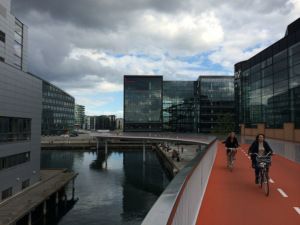News
Copenhagen receives international acclaim for creating good urban spaces
This article is more than 9 years old.
Capital awarded coveted architectural prize

Cykelslangen was one of the reasons Copenhagen was awarded for it’s urban spaces (Surelars)
Copenhagen was awarded the European Prize for Urban Public Space in Barcelona on Monday night.
The city received the international recognised architectural award for its work on creating a city with a focus on good urban spaces and a high quality of urban life. The jury noted that Copenhagen has, as policy, adopted a vision of quality urban life and recognised the city with an overall prize rather than individually rewarding the three nominated projects, Cykelslangen, Ny Nørreport og Tåsinge Plads.
“Copenhagen is already internationally recognised as a city with a strong focus on quality of life because of our bicycle culture, a very green environmental profile and a vibrant city life,” Morten Kabell, Copenhagen’s technical and environmental mayor.
Awards not the goal
Although pleased with the award, Kabell said that “international recognition must never become a pretext” for development in Copenhagen.
“We should continue to develop our city and set new goals, and we must be open to learning from other cities around the world,” he said.
Kabell said that in coming years, Copenhagen would focus on becoming even more green and look for ways to deal with flooding caused by heavy rains.
READ MORE: Copenhagen named ‘best city in the world’ by design magazine Wallpaper
European Prize for Urban Public Space is awarded every second year. The competition is organised by seven European institutions with the aim to recognise and promote excellence in urban spaces.










































